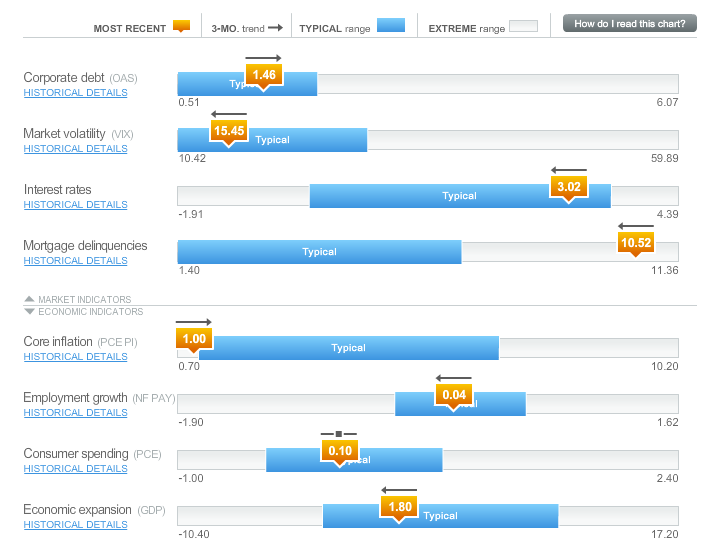Some may regard this as good news (its really a sign of the times that some regard this as good news), I would say that it shows that Bernanke's efforts are trying desperately to push home prices up but are failing miserably and that prices still need to fall.
Anyway, Russel investments has this cool economic indicator dashboard out this interactive, click below to mess with it.
You can see how much mortgages delinquencies are above the average. And is it me or does the typical range for Core CPI of 1% to 6.8% seem high?
The head of the Central Bank of Afghanistan has fled to the U.S. the Wall Street Journal is reporting:
KABUL—Afghanistan's central bank governor has left for the U.S. and isn't expected to return because he fears for his safety after investigating fraud allegations at the country's largest lender, according to two Western officials.Since we are nation building over there, maybe Bernanke could give Fitrat's replacement some tips on how to throw $600 billion at something and get barely nothing in return. Perhaps our military could give'em some advice on how to waste money over there:Bank Governor Abdul Qadir Fitrat left Kabul for the U.S. about 10 days ago, one of these people said. Last year Mr. Fitrat opened an investigation into Kabul Bank, which nearly collapsed amid public allegations that its owners used it to make favorable loans to themselves and politically connected associates.
Anderson calculates more than 1,000 troops have died in fuel convoys, which remain prime targets for attack. Free-standing tents equipped with air conditioners in 125-degree heat require a lot of fuel. Anderson says by making those structures more efficient, the military could save lives and dollars.$20.2 billion for air conditioning? Are you kidding? Keep an eye out for some Congressman to invoke the images of dying soldiers fighting for our freedom to throw some more money away over there. The real solution = bring them all home.
Still, his $20.2 billion figure raises stark questions about the ongoing war in Afghanistan. In the wake of President Obama's announcement this week that 33,000 American troops will soon return home, how much money does the U.S. stand to save?
Dollars And Cents
The 33,000 troops who will return home by the end of next year match the numbers sent to Afghanistan in 2010, at a cost of about $30 billion. That comes out to about $1 million a soldier.
Check out this from investing expert Jim Rogers:
I do not see any major new sources of supply. We know that the known reserves of oil continue to decline worldwide. We know that there are huge shortages of agriculture developing. I don’t know if you knew this, but the average age of farmers in America is 58 years old. In 10 years, they’re going to be 68, if they’re still alive.Rogers may be right, we could be in for an agricultural crisis and we will see setbacks, but I am confident we can adjust and carry on. We have done a pretty good job of making food pretty abundant in this country. More land will have to be dedicated to farming to supply emerging markets, but I don't see this as being impossible and leading to massive famine. And I am not even gonna touch on unforeseen technological improvements or increased demand for heavy duty farming equipment and vehicles. The average age of farmers may be going up, but as agricultural continues to be a profitable industry, more people will move into it. This is especially true as economic malaise continues and many service jobs continue to be outsources or irrelevant. In fact, one can see an expansion in the agricultural field as a good thing because it hardly requires a college education, maybe not even a high school diploma. The young won't have to become debt slaves to have a decent job. Americans may not like it at first, but a grumbling stomach may not give them a choice. John Stewart is wrong, just because the U.S. as a country has progressed economically as a phenomenal rate, that doesn't mean that we somehow have earned the right to never go back.
Throughout the world, we have serious, maybe even catastrophic developments in agriculture, which is going to hurt us all over the next couple of decades. There will be setbacks and corrections along the way, but we have serious problems facing us in nearly all commodity areas.


Tidak ada komentar:
Posting Komentar